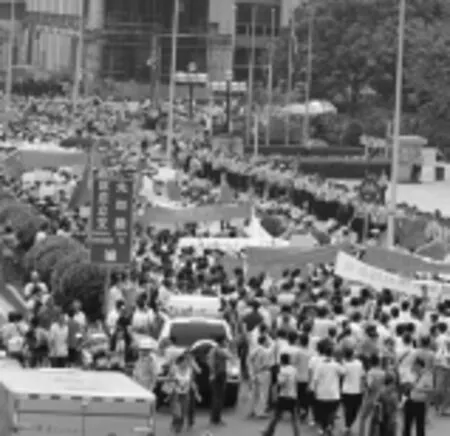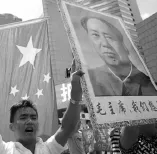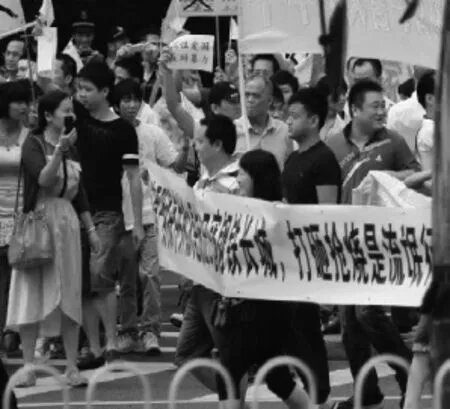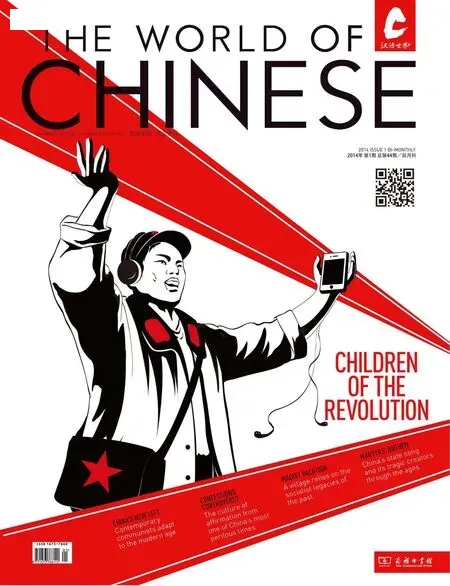CHINA'S NEW LEFT
CHINA'S NEW LEFT
BY CARLOS OTTERY, ADDITIONAL RESEARCH BY WEIJING ZHU (祝伟婧)
China's relationship to communism is often a bundle of contradictions. In what can appear like acts of remarkable cognitive dissonance: the nation propagates “socialism with Chinese characteristics” while aggressively privatizing many of its state-owned companies; Marxism is preached and Western thought condemned; and Maoist imagery abounds while the authorities remain paranoid of actual Maoists.
The left has long been famed for turning in on itself and struggling over the minutiae of its own terminology instead of working towards the utopian society it craves—as deftly parodied by Monty Python, The People's Front of Judea's real enemy is The Judean People's Front, and it happens the world over. In Britain alone, the left has spawned the British Communist Party, the Labour Party, the Independent Labour Party, Socialist Labour, and the Socialist Workers Party to name but a few.
Deciphering attitudes toward and within the Chinese left is diff i cult because the terms evoke different connotations to those in the West. In the West, the left are often radical reformists, and the right are quite happy to hold steadfast to the status quo; in China, having had a communist government for so long means the right are the ones who seek social change, while the left are often painted as the crazed conservative reactionaries refusing to embrace modernity, preferring to nostalgically hark back to an earlier era. Due to these pejorative connotations, many in the broad church that has been termed the Chinese New Left reject the label.
Rejecting the label or not, the Chinese New Left are a real, large, and loosely-knit group, coalescing around the idea that China has gone too far in embracing a neoliberal capitalist model. Though active in their criticisms to different degrees, they come from a wide range of backgrounds: elderly peasant farmers full of nostalgia for the Cultural Revolution; disenfranchised white collar workers who feel they are not getting a fair deal; academics, both at home and abroad, furiously scribbling away with Marxist semantics; workers longing for a return to their simpler “iron rice bowl”jobs; young students raging against the mainstream; and—of course—a whole gaggle of radical thinkers on any number of leftist websites. The extent to which they agree with each other is up for debate—though with the left being the left, the answer is probably not much—but one key point is undeniable: economically speaking, China has marched fi rmly to the right; the gap between the rich and poor is wider than ever. The genesis of the New Left can be traced to the Reform and Opening Up. These economic reforms saw a series of measures, including the de-collectivization of agriculture, the re-opening of the Shanghai Stock Exchange, the creation of special economic zones, the introduction of a dual pricing system, and the restructuring and privatization of many state-owned enterprises. For a long time, the majority in China supported the reforms, and, if anything, believed these reforms were not going fast and far enough. Such feelings famously came to a head in 1989.
Li Minqi, Professor of Economics at the University of Utah, one of the Chinese New Left's leading scholars, is a self-confessed Maoist but he wasn't always: “Like many Chinese intellectuals and college students at the time, I was quickly convinced that
在西方,“左”代表激进,“右”代表保守;在中国,新“左派”们却热烈地怀念着过去的
红色年代In Chinese politics, it is diff i cult to know what's left
“IF YOU CHOOSE TO DO THAT, THEN YOU HAVE TO ACCEPT THE CONSEQUENCES IF YOUR ATTEMPTS ARE NOT SUCCESSFUL”free market capitalism was the best model of development. I considered the state sector workers to be ineff i cient and lazy parasites on the rest of society…[and that] all state-owned enterprises should be privatized and all workers should be fi red.” Make no mistake, these beliefs were by no means the product of a namby-pamby, liberal student with too much time on his hands; Li had absolute conviction in his beliefs, and shortly after the Tian'anmen Square incident in 1989 he was arrested for them, ultimately spending two years as a political prisoner. Such drastic results are something he says he was ready for. The 1989 student movement, according to Li: “Was one that intended to overthrow the Communist government. If you choose to do that, then you have to accept the consequences if your attempts are not successful. I was prepared.”
Students perform thezhongziwu, or loyalty dance, in front of a Mao portrait on the campus of Hefei University of Technology in 1967. Such dances were a popular way to demonstrate one's faith and devotion to Mao during the Cultural Revolution.
At this stage, it is easy to wonder how a man who was so attached to neoliberal beliefs that he was willing to go to jail for them ended up aMaoist who believes in a “zero-growth model”, strongly criticizing the government from the left. He explains, “[During the incident] many workers came out to support the students. I began to wonder why…After all, if we were to be in power, the fi rst thing we would do would be radical privatization that would inevitably lead to massive unemployment.” It was this very conf l ict that caused confusion for Li; at a potential moment for signif i cant change, liberal student leaders had failed to mobilize workers, and an entire movement failed, as Li says: “I recalled some analysis of historical development from a class perspective. I told myself, ‘Maybe there is something useful in Marxism.' I gradually converted to a leftist, a Marxist, and eventually a Maoist.”

Li's notion that privatization would lead to massive unemployment did not turn out to be fantasy; between 1993 and 2002, the restructuring of state-owned enterprises (SOEs) led to the loss of 63 million jobs in China. Rural workers had no choice but to pour into the cities, searching for jobs on an unprecedented scale; the modern migrant worker was born and so was the New Left.
It's easy to think of the New Left as a group of academics who sit around in their ivory towers, chin scratching, navel gazing, musing on Marxist terminology, and writing arcane papers, but there is a lot more to them than that. Many of the group actively protest with fi re burning in their bellies. In 2012, there was a series of off i cially tolerated anti-Japanese protests (one of the streams of the New Left is highly nationalist); what was striking about them was the heavy use of Maoist imagery amongst the protesters. During the protests, Han Deqiang, one of the founders of China's most popular leftist website, Utopia, overheard an elderly man criticize Chairman Mao; rather than engage in political debate, Han just slapped him in the face, starting a scuff l e. The Chinese internet was agog that Han, an academic, would resort to physical violence to defend himself. Han was contrite and almost endearingly childlike in his defense, writing: “In a passionate protest against the Japanese, in memory of Chairman Mao, this kind of outright traitor talk is not allowed. If I run into this kind of traitor in the future, I'll strike again when I have to! If I committed a crime, I accept its punishment, but I won't admit I was wrong.”
Such passion certainly doesn't go unnoticed, and the New Left is an undoubted source of more than minor irritation for the government. Whereas attacks from the right can be simply swatted aside (who cares what evil capitalist roaders have to say?) any criticism from the left forces the Party (which is communist after all) to perform a series of awkward twists and turns. Mao's symbolic power in China is immense; since 1999 his picture has been embossed on all the paper money—something he was fi rmly against in his lifetime—and his beatif i c image looms large over Tian'anmen Square. Every year on September 9, the country holds commemorations on the anniversary of his death. One such tribute was held in Zhengzhou, Henan Province, in 2004. On the morning of the event, Chinese activist, Zhang Zhengyao gave out leaf l ets entitled, “Mao Zedong Forever Our Leader!”; a few hours later he was arrested for state subversion. While heavily pro-Mao, the leaf l et was critical of the Party itself, it begins: “In the past 28 years, the reactionary forces headed by
“IN THE PAST 28 YEARS, THE REACTIONARY FORCES HEADED BY CAPITALIST ROADERS WITHIN OUR PARTY HAVE USURPED THE STATE AND PARTY POWERS AND DIVIDED UP STATE ASSETS AMONG THEMSELVES“capitalist roaders within our party have usurped the state and party powers and divided up state assets among themselves. Meanwhile, they have been spewing deep-seated hatred and venom against Mao Zedong and his socialist legacy.”
Three others, associated with the leaf l et, were later arrested, and the Zhengzhou Four (not to be confused with the Zhengzhou Four in 2012, which consisted of four young men tearing up Mao portraits in front of his statue, later uploading the image online), as they later became known, were all sentenced to three-year prison terms, eventually under the less serious crime of intentionally spreading falsehoods to damage others' reputation and undermining social order and the national interest.
The New Left undoubtedly fray the government's nerves, and aside from these arrests, the government frequently shuts down (or at the very least removes articles from) any number of popular leftist websites, such as Utopia, Mao Flag, and Red Culture, but it is not only activists and bloggers on the left who are at risk of being purged. Arguably, any leftists that exist too prominently within the party are for the chop as well. Disgraced former Chinese politician, Bo Xilai (薄熙来) was the biggest case in point. Amongst Chinese politicians, Bo was unusual: handsome, extraordinarily charismatic, and able to mobilize popularity among the working and middle classes with his populist “Red Culture” campaigns in the city of Chongqing where he served as secretary of the CPC. His leadership of the city oversaw countless leftist campaigns and polices, including massive investment in public infrastructure and increases in housing subsidies for the poor. On the cultural front, his cadre saw the making of a series of nostalgic revolutionary programs, schoolchildren singing red songs, and even the sending of millions of text messages containing direct quotes from Mao'sLittle Red Book. The public, at least those on the left, loved it, but the Party was clearly uncomfortable with his popularity and leadership style.
Bo's downfall ended with the nation's most signif i cant trial for a generation. In a case that spanned wiretapping, bribery, and eventually even murder, Bo was sentenced to life imprisonment on several counts of corruption on September 22, 2013. There has been much theorizing as to specif i cally what caused Bo's undoing; that he was involved in some pretty heavy-duty corruption is not in question, but the New Leftists have other ideas, believing it was his leftist experiment that became known as the “Chongqing model” that brought him down. As professor Li put it: “Bo Xilai's experiment at Chongqing represented the last serious attempt from certain sections of the ruling class to undertake meaningful social reform. His downfall was not about corruption…and everything to do with class struggle and different political lines.”
The consensus of most of the major leftist websites is the same. On a cold and blustery night, I and a colleague arranged to meet Shi Mai, a co-founder of the popular leftist website Mao Flag, and Zhang Xia, editor of leftist journalThe Red Years(《红色年华》), outside Renmin University for dinner. Shi dressed in clothing heavily resembling a blue Mao suit as well as a Mao cap. I assumed he was being mischievous, and joined in the fun, orderinghongshaorou(reputedly Mao's favorite dish), receiving knowing smiles all round. The dinner almost felt conspiratorial, and in another era we could been plotting revolution. Much like Utopia, Mao Flag was supportive of Bo, and the website experienced diff i culties accordingly: “During Bo's fall was a diff i cult time for us. The government shut us down and we have been heavily monitored ever since,” Mai said. He went on to speak about the purpose of the website, how it was set up to support old comrades, to be a space to debate reform, public ownership, and to guard against what leftists
“DURING BO'S FALL WAS A DIFFICULT TIME FOR US. THE GOVERNMENT SHUT US DOWN AND WE HAVE BEEN HEAVILY MONITORED EVER SINCE”
In August and September 2012, triggered by the Diaoyu Islands dispute, anti-Japan protests broke out across Beijing, Shenzhen, Guanzhou, Hong Kong, Qingdao and dozens of other cities. Many of these protests saw Mao portraits once again hoisted in fierce nationalitic fervor.















“THE PARTY? WHY SHOULD WE JOIN THE PARTY?”call “historical nihilism”.
Among the New Left, and indeed the Party itself, there is a widespread fear of historical nihilism—the idea that certain people, especially rightists, are attempting to manipulate certain aspects of history, particularly the Cultural Revolution. Virtually every leftist I spoke to defended this period to at least some degree.“People are coming out to repent for their crimes during the Cultural Revolution; they want to apologize and negate what happened, but they are not anti-Cultural Revolution heroes and they should hold direct responsibility. Mao promoted a verbal not physical struggle,” said Mai. Professor Li offered a similar response: “Mao was simply a historical representation of the period. As an individual, he could not move and change hundreds of millions of people. Instead the historical actions of hundreds of millions of people found their personal expression in Mao.”
Debates about the Cultural Revolution and the redness of Bo Xilai aside, a crucial issue for Chinese New Leftists, and indeed leftists the world over, is if the radical social change they want should come from the bottom-up or the top-down; in essence, revolution or evolution? To answer this question one fi rst needs to know to what extent there are any leftists in the Party at all. Surely, if the left want to affect real social change, a position in the party might not be so bad. When the question was put to Zhang Xia, editor of leftist journalThe Red Years, she looked at me quizzically, simply saying: “The Party? Why should we join the Party?” An editor at Mao Flag is equally cynical: “Some say there are ‘healthy elements' within the Party, but I don't believe it. How can you expect change to come from those detached from the people?”
If the New Left were to have a fi gurehead, and it is a label he would quickly reject, then it would without doubt be Wang Hui, professor at the departments of history and literature at Beijing's Tsinghua University and one of China's leading public intellectuals. In a quiet corner of the University, he answers my questions thoroughly and at length, refusing to see any issues in simple terms of black and white (or even red). Though on a personal level he rejects the label New Left, he gives detailed analysis of the issues that saw the New Left rise, citing the privatization of SOEs, the agricultural crisis starting in the 90s, and the desperate need for social welfare and medical care throughout China. Perhaps bef i tting his very public position, Wang's politics seems to take on a more liberal, nuanced hue than other leftists, and he believes that these, so-called, “healthy elements” within the party do exist, at least to some degree: “The division between the people and the Party is gone. Any elements you can fi nd in the society, you can fi nd in the Party, perhaps not at the elite level, but it must exist.” At the suggestion that Bo Xilai represented these elements, Wang is dismissive, and while he points to many aspects of the Chongqing model that proved useful in terms of social equality, he quickly says: “I have no way to know if Bo was an opportunist or a leftist. We don't know if the trial is right or wrong or true or false. Who can say about his private life?”
As is often the case with Party diktats, the message is unclear, and, strategically at least, Maoism seems to be being embraced at some level amongst the senior echelons of the party, but many suggest this is more about political rhetoric than anything else. On April 22, 2013, the Central Committee of the CPC sent out a communiqué, later dubbed Document Nine, to all local divisions of the Party; incredibly spiky in tone, it warned Party cadres to guard against what it saw as several worrying ideological threats, including the promoting of neoliberal thought and the promotion of historical nihilism. Such words could easily have been written by any number of New Leftists, many of whom fi rmly warn against these two
“THE GOVERNMENT IS NOT UNIFIED EITHER. IT IS A COMBINATION, AND THERE ARE DIFFERENT PERSPECTIVES WITHIN THE GOVERNMENT.”very things. Confusingly, the document also warned against those critical of the Reform and Opening Up policy. It was seemingly a paper that, if needs be, could lead to the exclusion of those on the right or left.
Pushed for answers regarding the government's relationship with capitalism, Professor Wang says: “The government is not unif i ed either. It is a combination, and there are different perspectives within the government. Obviously over the last decade it is perceived that that there are conf l icts and debates within the party too. So, it is diff i cult to think of the party as a unif i ed thing…As an organization, it is unif i ed, but still you fi nd different forces there. But now, in the economic fi eld, the neo-liberal ideas are strong, very strong. Look at the position from the third plenum; they think the market should be given a decisive role in terms of allocation of property and resources. The rhetoric is neoliberal.”
When they aren't arguing amongst themselves, then capitalism is enemy number one for the New Left, though there is no consensus on how this should be dealt with. Professor Li holds what is in many ways a classic Marxist view of history and sees capitalism itself as laying the seeds of its own destruction, offering the damming verdict: “The Chinese capitalist model has been based on the intense exploitation of a large cheap labor force as well as cheap energy and natural resources. But within a decade, we're likely to see the surge of working class militancy. Moreover, resource depletion and environmental degradation are likely to break critical thresholds.” Li even goes as far as to say that these thresholds combined with social crisis will lead to the complete downfall of the capitalist system in China, possibly by as early as 2020.
The idea of working class militancy is not a new one, and—certainly as the gap between the haves and the have-nots grows—it stands to reason that there are going to be a lot of angry, disenfranchised workers and even mass unemployment, but capitalism collapsing in China within a decade strikes many as far-fetched, to say the least. When presented with Li's“the-end-is-nigh” scenario for Chinese capitalism, Wang laughs. It turns out Wang and Li are longtime friends, and I suspect they have had these debates themselves, long before our conversation; Wang clearly has little time for wholesale revolution: “Yes there has been an intensif i cation of social conf l icts, but it hasn't been nationwide. But, in 20 or 30 years...it could be disastrous. In order to avoid that, and I don't just mean revolution, you need the change to start now. But of course we need radical change, not these kinds of small changes. These kinds of changes only shift and maintain stability for those at the top.”
If those on the left do not think revolution, with all the bloodshed that it historically entails, then what do they want? “We need big social experiments. Economically speaking, [China] will continue for decades but it won't collapse. Social conf l icts will intensify, but that doesn't mean it will burst. Look at 1930s America, it became a big power and there was huge social conf l ict, and these were the conditions for the New Deal.” When asked if China could perhaps have some sort of new deal, it is the fi rst time he does not give a long, involved, analytical answer, simply saying, “I hope so.”
Workers, bloggers, activists, students, and scholars—the New Left come in many different shades of red. Whether bookish academic, or angry protester, their fears form a consensus of sorts. A country that concentrates wealth in the hands of so few while, according to the World Bank, up to 250 million people live on less than $2 a day is surely a ticking time bomb; with such vast reserves of currency, is it too much to ask for a decent health system for those that need it? One thing remains certain, as long as the chasm between the rich and poor continues to relentlessly grow, those on the left will not go away quietly and will continue to fi ght for a social equality that they believe is not only just, but necessary. As things stand, it is easy for things to look bleak for those on the Chinese left, but they continue to believe, as Shi Mai said,“Regarding the future, we are optimistic. We believe history moves in zigzags, but it will be bright. Salute!”

